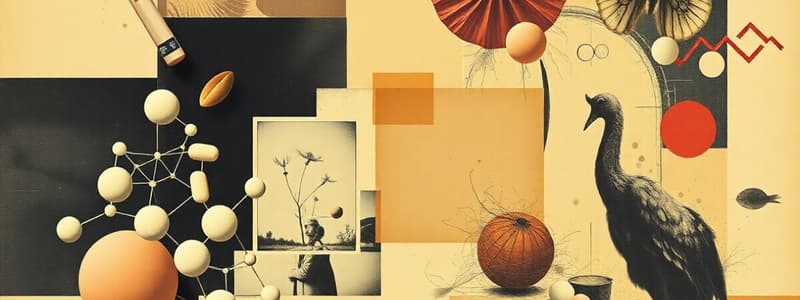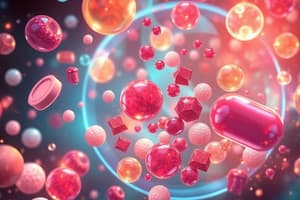Podcast
Questions and Answers
What is pharmacology?
What is pharmacology?
The science that deals with the study of drugs and their interaction with living systems.
What does the term 'drug' refer to?
What does the term 'drug' refer to?
A substance used in the diagnosis, prevention, or treatment of disease.
Which of the following are natural sources of drugs? (Select all that apply)
Which of the following are natural sources of drugs? (Select all that apply)
- Plants (correct)
- Animals (correct)
- Synthetic drugs
- Minerals (correct)
Pharmacokinetics studies the absorption, distribution, metabolism, and excretion of drugs.
Pharmacokinetics studies the absorption, distribution, metabolism, and excretion of drugs.
What are the major transport mechanisms in pharmacokinetics?
What are the major transport mechanisms in pharmacokinetics?
What is passive diffusion?
What is passive diffusion?
What is the facilitated diffusion?
What is the facilitated diffusion?
Which of the following are advantages of enteral drug administration? (Select all that apply)
Which of the following are advantages of enteral drug administration? (Select all that apply)
Which of the following are disadvantages of enteral drug administration? (Select all that apply)
Which of the following are disadvantages of enteral drug administration? (Select all that apply)
Study Notes
Pharmacology Definition and Drug Classification
- Pharmacology studies drugs and their interactions with living systems. The word originates from Greek: "pharmacon" (drug) and "logos" (study).
- A drug is a substance used to diagnose, prevent, or treat disease. The WHO defines it as something used to modify or explore physiological systems or pathological states.
Drug Sources
- Natural Sources: Plants (e.g., atropine, morphine, quinine), animals (e.g., insulin, heparin), minerals (e.g., magnesium sulfate, aluminum hydroxide), microorganisms (e.g., penicillin, cephalosporins), and humans (e.g., immunoglobulins, growth hormone).
- Synthetic Sources: Most drugs are now synthetically produced (e.g., quinolones, omeprazole, sulfonamides). Others are from cell cultures (e.g., urokinase) or recombinant DNA technology (e.g., human insulin). Monoclonal antibodies are produced using hybridoma technology.
Pharmacokinetics
- Pharmacokinetics studies drug absorption, distribution, metabolism, and excretion (ADME) – the movement of drugs in and out of the body.
- Drug movement involves crossing biological barriers (e.g., intestinal epithelium, cell membranes, renal membranes).
- Biotransport is the movement of drugs across barriers. Transport mechanisms include:
- Passive Diffusion: Movement from high to low concentration without energy expenditure.
- Carrier-Mediated Transport: Uses carrier proteins; includes:
- Facilitated Diffusion: High to low concentration, no energy needed. Example: GLUT 4 transporting glucose.
- Active Transport: Requires energy to move drugs against a concentration gradient.
- Pinocytosis: Cell engulfs fluid containing drug (e.g., insulin crossing the blood-brain barrier).
- Phagocytosis: Cell engulfs particulate matter (e.g., botulinum toxin poisoning).
Routes of Drug Administration
- Routes depend on drug properties and patient needs.
- Enteral Route (Oral Ingestion): Most common, safest, and economical.
- Advantages: Safest, convenient, self-administerable, non-invasive.
- Disadvantages: Slower onset, unsuitable for irritants, may be destroyed by gastric juices (e.g., insulin), potential for vomiting.
- Other Routes: Parenteral and Local (These are not fully detailed in provided text).
Studying That Suits You
Use AI to generate personalized quizzes and flashcards to suit your learning preferences.
Related Documents
Description
Explore the fundamental concepts of pharmacology, including drug definitions and their classifications. Learn about natural and synthetic drug sources, as well as the principles of pharmacokinetics. This quiz is essential for understanding how drugs interact with living systems.



